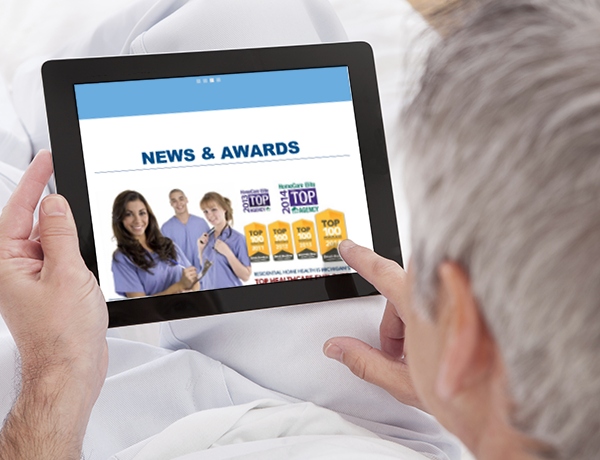Transforming Seniors’ Health Through Technology
 Global technology leaders IBM and Apple are working together to pilot an immense new social program. In partnership with Japan’s largest health and life insurance provider, the companies plan to distribute millions of Apple iPads to the country’s senior citizens by the year 2020. The program will include training for using these tablet computers, which will come pre-loaded with health applications developed specifically to assist with medication management, communication with family and caregivers, and other methods of search and support for successful aging in place.
Global technology leaders IBM and Apple are working together to pilot an immense new social program. In partnership with Japan’s largest health and life insurance provider, the companies plan to distribute millions of Apple iPads to the country’s senior citizens by the year 2020. The program will include training for using these tablet computers, which will come pre-loaded with health applications developed specifically to assist with medication management, communication with family and caregivers, and other methods of search and support for successful aging in place.
Although there are likely barriers to starting a similarly structured program in the United States, this experiment in technology-supported self-care may be interpreted as a sign of more widespread adoption and practical use of personal computing technology by the elderly.
(Massive New iPad for Seniors Program to Support Aging at Home; Home Health Care News)
But even though technology is continuing to show exponential growth in adoption and capability, the results of a recent caregiver survey suggested that a majority of seniors may not be getting on board. Two-thirds of caregivers reported that the seniors in their care relied primarily on the television and telephone for enrichment. Curiously, most caregivers also said it would be fun to introduce new technology, that their loved one is ready to learn, and that the new activity could translate to time savings for the caregiver. These conflicting results circle around a primary caregiving dilemma: keeping up with a loved one’s essential daily needs can mean passing on other activities that might enhance quality of life in other ways.
(Family Caregivers: Biggest Barrier to Home Care Tech?; Home Health Care News)
Understanding and Combating Cognitive Slips
With advancing age, episodes of absent-mindedness can understandably cause concern — is it a harmless memory lapse, or an early symptom of cognitive decline such as dementia? This article is quick to reassure that forgetfulness is a fact of life, and clarifies how to distinguish the natural memory slow-downs that come with age from the indicators that could signal a more serious issue. It also closes with suggestions for keeping sharp, such as learning and doing new things, staying socially engaged, and maintaining brain-boosting diet and exercise habits.
(As We Age, Keys to Remembering Where the Keys Are; NYT Well blog)
For those who crave a bit more certainty about their cognitive state, this related piece discusses two established assessments, which can be performed in a matter of minutes at a doctor’s office. While not intended to be used as official diagnostic tools, these brief tests can serve as simple indicators of when more sophisticated testing may be necessary.
(Is It Ordinary Memory Loss, or Alzheimer’s Disease?; NYT Well blog)
An Artist and Cancer Survivor Revamps Empathy
When a friend or loved one is battling a serious illness, you may be at a loss for words. When graphic designer Emily McDowell had Hodgkin lymphoma more than a decade ago, she felt lonely and awkward as people in her circles would say the ‘wrong’ things…or nothing at all. These memories have now inspired the opposite: a line of greeting cards for supporters who are unsure of what to say. The cards range from simple expressions of caring to humorous, sneering rejections of platitudes like ‘everything happens for a reason.’ (Fair warning: McDowell’s specific perspective includes a bit of salty language.) Read more about the artist in the article below, or go directly to the collection and shop around.
(Are You Sick, And Sick Of Hearing ‘Everything Happens For A Reason’?; NPR)
Other News
- Research continues to reveal how our bodies respond to glucose differently at different times of day. The results of a new study have reinforced the importance of eating breakfast, and also suggested that making protein part of that meal can have long-lasting benefits. (Prevent type 2 diabetes blood-sugar spikes by eating more protein for breakfast; MNT)
- When tracking our calorie and nutrient intake, we may forget to include beverages, but these can be a major source of excess sugar. A recent study found that replacing even one serving of a sugary drink with an unsweetened beverage each day could greatly reduce diabetes risk. (Replace soda with water, tea or coffee to fight diabetes, study suggests; MNT)
- Another research group found that patients with type 2 diabetes tend to continue vigilant monitoring and management while in hospice care, although this level of invasiveness may no longer have a suitable benefit. (Less aggressive diabetes care needed in hospice; Reuters)
- Author Jan Doughtery notes the growing awareness of Alzheimer’s disease in younger populations, and offers some simple methods to get involved and be supportive. (Millennials Can Change the Face of Alzheimer’s; Huffington Post)
- For smokers with diabetes, quitting can alter the body’s glucose control processes for up to 3 years, which may require a little more attention from the patient. (But, it bears repeating, the risks of continuing to smoke are far worse — at all stages of life, quitting is the better bet.) (Study links quitting smoking with deterioration in diabetes control; MNT)
- Get refreshing days and restful nights through the magic of a proper nap. (Six Tips For Better Napping; WSJ Health blog)
- Finding a gene that makes major contributions to the aging process could lead to future advances to combat age-related diseases such as cancer or cognitive decline. (Scientists discover key driver of human aging; MNT)

